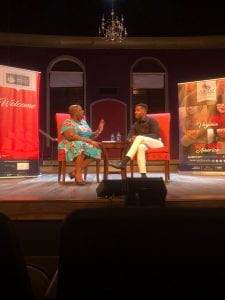 Post by Bryana Moore, ’19-’20 Engagement Fellow
Post by Bryana Moore, ’19-’20 Engagement Fellow
The James Madison Center for Civic Engagement’s Fellow, Bryana Moore and group of Engagement Fellows, attended the 1619 Making of America Summit at Norfolk State University on September 25 through 27, 2019. Bryana writes about the summit and what she learned.
The three-day summit focussed on the 400 years since the arrival of enslaved Africans, English settlers, and colonization of Native lands. Over the course of the summit, Bryana and the group of JMU Engagement Fellows observed student-designed short films; listened to round-table discussions with renowned historians, state officials, and Black creatives. Individuals also engaged with leaders and participants from around the country.
Nate Parker was a lead contributor to the summit as an award-winning actor, writer, director and producer. He with his mentor and co-founder of the Nate Parker Foundation, Brian Favors, lead discussions on the importance of guiding young Black creatives to share their stories through film. The first night of the conference ended with the film premiere of “HBCU Storytellers” a short documentary series created by students who attend Historically Black colleges and universities.
On Thursday, participants observed a round-table conversation with Dr. Joanne M. Braxton of the College of William and Mary, The Honorable Justin Fairfax, Lieutenant Governor of Virginia, and Ric Murphy, National Vice President for History for the Afro-American Historical and Genealogical Society. This conversation was designed to discuss the importance of genealogy – the study of families, discovering family history, and tracing lineages. At the end of the discussion, Honorable Justin Fairfax described a moment in his term overseeing Virginia’s Senate where ancestry played a significant role in his decisions. During a session, members of the Senate wanted to pay homage to Confederate leaders Robert E. Lee and Stonewall Jackson through prayer. Fairfax, a descendant of enslaved Africans, decided against it and did not lead the prayer his first year. The following year, Fairfax invited descendants of Lee and Jackson to join his silent protest. The three came together to show unity through acknowledging the struggles of the past.
Two major takeaways from this summit:
1. There’s so much more to history than what’s written in history books, depicted on movie screens, and circulated in mainstream media. It’s important to have Black creatives in spaces that recognize and uplift their work. Spaces that value their contributions and offer opportunities for growth. It’s important not only for these young creatives, but for future generations to see themselves in spaces that were once exclusively white. Establishing one’s self in the film industry, or really anywhere, is critical to the framing of African American narratives for the present and future.
2. Americans, not just African Americans, need to understand their roots and ties to history. It is extremely important to understand who and where we come from. The Honorable Fairfax’s story portrays the necessary importance of acknowledging the past and making strides towards a more honest future.

Recent Comments